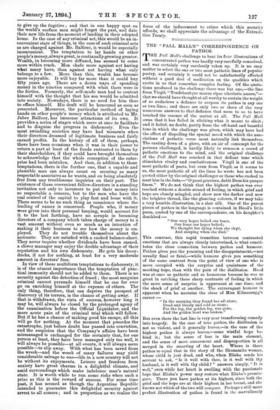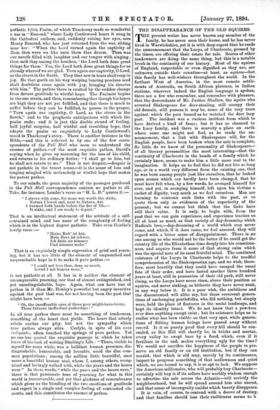THE " PALL MALL'S" CORRESPONDENCE ON PATHOS.
THE Pall Mall's challenge to beat its four illustrations of concentrated pathos was hardly very carefully conceived, and was certainly very carelessly taken up. It is no easy
matter to select the one or two most pathetic lines of popular poetry, and certainly it could not be satisfactorily effected without a good deal of meditation on the qualities which excite in us that somewhat complex feeling. Of the quota- tions produced in the challenge there was but one,—the line from Virgil, " Tendebantque manna ripae ulterioris amore,"— that we should have thought at all worthy to sustain the weight of so audacious a defiance to surpass its pathos in any one or two lines ; and there are only two or three of the very numerous answers to that defiance that seem to us to have
touched the essence of the matter at all. The Pall Ma// owns that it has failed in eliciting what it meant to elicit; and it failed, no doubt, partly from the off-band and boastful tone in which the challenge was given, which may have had the effect of dispelling the special mood with which the asso- ciations of pathetic verse most naturally link themselves. The casting down of a glove, with an air of contempt for the persons challenged, is hardly likely to summon a crowd of pathetic emotions to the mind, and the original challenge of the Pall _Mall was couched in that defiant tone which stimulates rivalry and combativeness. Virgil is one of the most pathetic of poets, but even from Virgil, as it seems to us, the most pathetic of all the lines he wrote has not been quoted either by the original challenger or those who rushed to meet him in the lists,—" 0 passi graviora, dabit Dens his quoque foam." We do not think that the highest pathos was ever
reached without a double strand of feeling, in which grief and hope are closely mingled, and show now the darker and now the brighter thread, like the glancing colours, if we may take a very humble illustration, in a shot silk. One of the purest pieces of pathos in the language is contained in Hood's little poem, quoted by one of the correspondents, on his daughter's deathbed :—
" Our very hopes belied our fears,
Our fears our hopes belied ; We thought her dying when she slept, And sleeping when she died."
This contrast, this rapid transition between contrasted emotions that are always closely intertwined, is what consti- tutes the close connection between pathos and humour. Pathos gives you the yearning and the disappointment,—not usually final or fatal,—while humour gives you something of the same contrast from the point of view of one who is more occupied with the surprise and quaintness of the mocking hope, than with the pain of the disillusion. Hood was at once so pathetic and so humorous because he was so great in catching these sharp contrasts of feeling in which the mere sense of surprise is uppermost at one time, and the shock of grief at another. The extravagant humour is apparent when he narrates the close of Miss Kilmansegg's
career :—
" In the morning they found her all alone, Dead and bloody and cold as stone; For the leg, the golden leg, was gone, And the golden bowl was broken."
But even there the last line is very near transforming comedy into tragedy. In the case of true pathos, the disillusion is not so violent, and it generally leaves,—in the case of the highest pathos it always leaves,—some wistful hope be- hind it; but the sense of loss is the main element, and the sense of mere amazement and disproportion is all merged in the smarting of the heart. Where is there pathos to equal that in the story of the Shunamite woman, whose child is just dead, and who, when Elisha sends his servant to ask, "Is it well with thee, is it well with thy husband, is it well with thy child ? " answers simply, " It is well," even while her heart is swelling with the passionate hope that Elisha's power may restore what Elisha's promise gave. There you have pathos at its highest, since both the grief and the hope are at their highest in her breast, and she knows not which of the two will conquer. Perhaps a still more perfect illustration of pathos is found in the marvellously
pathetic 126th Psalm, of which Thackeray made so wonderful a use in "Esmond," where Lady Castlewood hears it sung in the Cathedral anthem, and, suddenly raising her eyes, sees Henry Esmond, who has just returned from the war, sitting near her : " When the Lord turned again the captivity of Zion, then were we like unto them that dream. Then was our mouth filled with laughter and our tongue with singing; then said they among the heathen, the Lord hath done great things for them.' Yea, the Lord hath done great things for us already whereof we are glad. Turn again our captivity, 0 Lord, as the rivers in the South. They that sow in tears shall reap in joy. He that goeth on his way weeping bearing precious seed shall doubtless come again with joy, bringing his sheaves with him." The pathos there is exalted by the sudden change from devout gratitude to wistful hope. The Psalmist begins in the one strain, and then, remembering that though his hopes are high they are not yet fulfilled, and that there is much to suffer before they can be fulfilled, he passes to the prayer, " Turn again our captivity, 0 Lord, as the rivers in the South," and to the prophetic anticipations with which the psalm ends; and it is just this double strand of feeling, half joyfal surprise, half wistful and trembling hope, that adapts the psalm so exquisitely to Lady Castlewood's mood in Thackeray's story. There is another instance in the
Bible,—and this is referred to by one of the few corre- spondents of the Pall Mall who seem to understand the
essence of pathos,—of the most exquisite pathos, David's saying when he gives up mourning for the loss of his child, and returns to his ordinary duties : " I shall go to him, but he shall not return to me." That is not despair,—despair is not pathetic in the truest sense,—it is the sense of loss and longing mingled with melancholy or wistful hope that makes the purest pathos.
To our minds, the great majority of the passages produced in the Pall Mall correspondence contain no pathos at all. Take, for instance, Landor's verse as " H. L. D." quotes it :-
" I strove with none, for none was worth the strife, Nature I loved and, next to Nature, Art.
I warmed both hands before the fire of life,— It sinks, and I am ready t3 depart."
That is an intellectual statement of the attitude of a self- contained mind, and has none of the complexity of feeling which is in the highest degree pathetic. Take even Goethe's lovely verse :— That is an exquisitely simple expression of grief and yearn- ing, but it has too little of the element of unquenched and unquenchable hope in it to make it pure pathos :— " I could not love thee, dear, so much, Loved I not honour more," is not pathetic at all. It has in it neither the element of unconquerable yearning, nor that of almost extinguished, and yet nnextinguishable, hope. Again, what can have less of pathos in it than Mr. Henley's powerful but angry invective against the past that was, for not having been the past that might have been :-
" Oh, the insufferable eyes of these poor might-have-beens, These fatuous ineffectual yesterdays ! "
In all true pathos there must be something of tenderness, something of the heart that yields. The heart that utterly rebels excites our pity, but not the sympathy which true pathos always stirs. Carlyle, in spite of his smva indignatio, often touched the springs of pure pathos. Yet no one has quoted the exquisite passage in which he takes leave of his task of writing Sterling's Life : "There, visible to myself for some while, was a brilliant human presence, dis- tinguishable, honourable, and loveable, amid the dim com- mon populations ; among the million little beautiful, once more a beautiful human soul, whom I, among others, recog- nised and lovingly walked with, while the years and the hours were " In those words, "while the years and the hours were," there is that passionate tone of yearning for what in this world is irrecoverable, and yet that gladness of remembrance which gives us the blending of the two emotions of gratitude and regret in a single and complex feeling of contrasted ele- ments, and this constitutes the essence of pathos.
"Heine Ruh' ist hin, Mein Herz ist schwer, Ich finde sie nimmer Und nimmer mehr."



















































 Previous page
Previous page